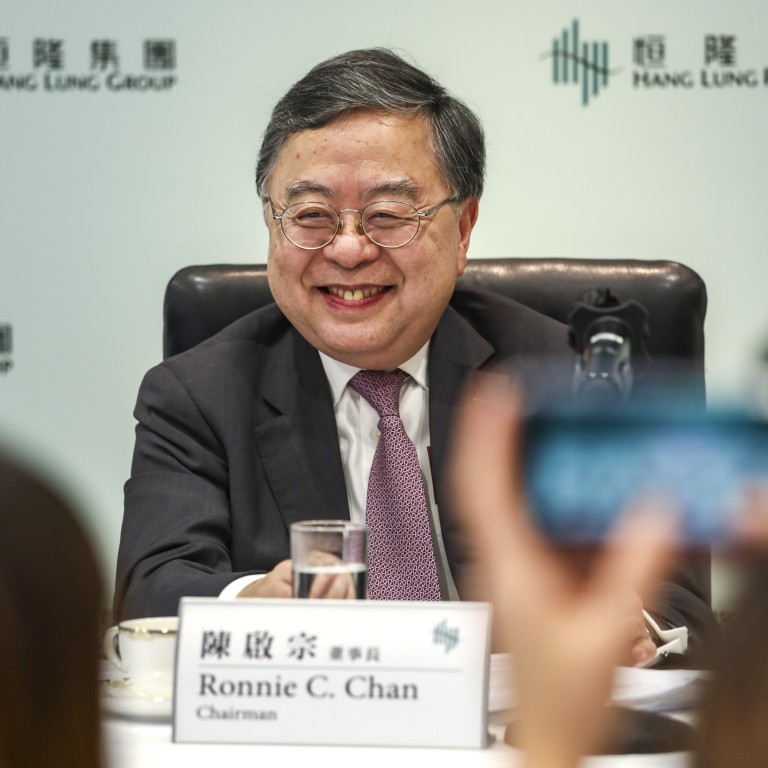
Hong Kong’s ‘unwise policies’ fuelled protests, unrest in city, Hang Lung Properties chairman Ronnie Chan says
- Unrest in the city ‘cannot but negatively affect business’, Hang Lung Properties chairman Ronnie Chan says
- Protests result of ‘unwise policies made locally and not initiated by Beijing’, Chan says
Hang Lung Properties chairman Ronnie Chan Chi-chung said the “unwise policies” of Hong Kong’s government had contributed to an atmosphere that sparked protests and civil unrest and are now threatening the city’s business community.
Chan, who is a supporter of Chief Executive Carrie Lam Cheng Yuet-ngor and her predecessor Leung Chun-ying, said the unrest “cannot but negatively affect business” and reduce “confidence among the international business community”.
Protests and increasingly violent confrontations between police and more radical groups of demonstrators have disrupted the city’s streets for more than three months, hitting retailers and tourism-oriented businesses particularly hard.
Are tycoons’ tangled ties to blame for Hong Kong’s anger?
The city’s government also cut its outlook for economic growth in 2019 to zero to 1 per cent last month, with several economists saying they expect the economy to contract this year.
Last week, Lam formally withdrew a proposed bill that would have made it easier to send criminal suspects to the mainland for prosecution. The protests were originally sparked by the bill, but have evolved into a broader conflict on income inequality and suffrage in Hong Kong.
The statement by Chan came on the same day as Sun Hung Kai Properties, the largest developer by value in the world’s least affordable housing market, said that occupancy rates at its hotels have plunged on average by 30 to 40 per cent and some hotels were only half full.
“Fewer customers came when a lot of Western countries issued travel warnings so the hotel industry has been affected quite a lot,” Raymond Kwok Ping-luen, SHKP’s chairman and managing director said.
Li Ka-shing’s appeal for leniency for Hong Kong protesters gets cool reception
Several of the city’s tycoons and businesses have condemned the violence and chaos spawned by the anti-government protests, with many taking out newspaper ads.
Hong Kong police have banned a mass rally and march planned for Sunday, citing the potential for “violence”, “road blockages” and “destruction”.
“Whether or not there will be any long-term effect will depend on how the situation resolves itself,” Chan said. “But for now, no one can predict how this will pan out. The local residential market will no doubt slow down. We will see if prices will fall alongside with volume. More likely than not, they will. Nevertheless, as long as Hong Kong gets back on its feet after the trouble is over – and over it will be, most probably with the help of Beijing – our residential market should be fine in the long run.”
Chan also said that the protests could force Beijing to “change its tack” regarding Hong Kong.
“Beijing has been too lax about enforcing the Basic Law in the past 22 years,” he said. “If the present turmoil forces all parties to embrace the Basic Law, this may not be a bad outcome. In this eventuality, Hong Kong’s residential market and indeed the entire economy may well gain a second wind. But for now, turbulence will be with us.”
Sun Hung Kai’s hotels ‘half empty’ as protests deter visitors
Chan said Hang Lung Properties was “fortunate” to have sold out of all of its development projects, “except for the 11 semi-detached houses on Blue Pool Road [in Happy Valley], one duplex in The Long Beach [in Kowloon] and some car parks.”
In July, the company reported its revenue declined 18 per cent to HK$4.2 billion in the first six months of 2019, down from HK$5.15 billion a year earlier.
Profit fell 25 per cent to HK$3.52 billion in the first half, compared with HK$4.69 billion in the first six months of 2018. On an underlying basis, the company’s first-half profit declined 4 per cent to HK$2.23 billion.
“We still hold out hope to sell these luxury units at good prices, but if we have to wait a bit, it is not the end of the world,” he said. “The timing is beyond us anyway. As for our Hong Kong investment properties, we will do our best to maintain the growth rate of the past two years at about 3 per cent per annum. If social unrest persists, it may prove to be difficult. Nevertheless, we should still be able to produce some growth in the second half of this year.”

